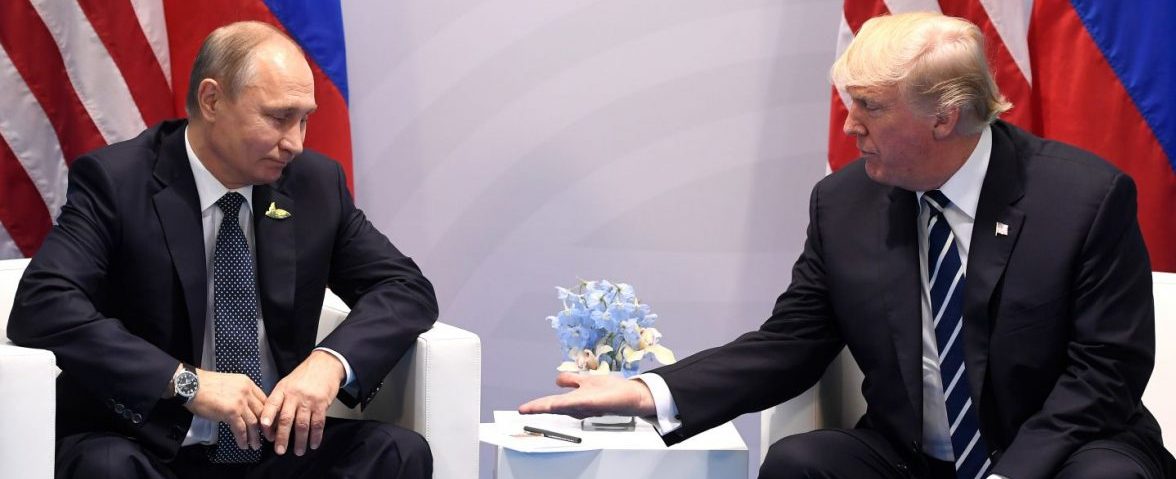Perhaps, the US-Russia relations are no longer central to the contemporary international relations system as they were back in the Cold War. Yet, they still to a large degree define the character of the majority of international security issues. Policy-makers and experts frequently turn to historic parallels and offer their own metaphors to best describe the current crisis state of US-Russia relations and define prospects for their further development. Max Suchkov discussed these issues with three leading American experts on US-Russia relations and US foreign policy.
Some analysts are looking towards November as a potentially important month for US-Russia relations: on Nov. 6th the midterm elections will take place and on Nov. 30th Buenos Aires will host the 2018 G20 Summit which Presidents Putin and Trump are both likely to attend. Do you expect a change in the US policy vis-à-vis Russia following the mid-term elections in Congress and does a potential meeting between Putin and Trump in Argentina have any importance or the relationship is hurt to the extent the two leaders can barely fix it?
Paul Saunders, Executive Director of the Center for the National Interest, director of the Center’s U.S.-Russian Relations Program and Associate Publisher of the foreign policy magazine The National Interest: I don’t see any reason to expect a change in U.S. policy toward Russia following the mid-term elections. The election is unlikely to affect the principal dynamics in the relationship—diverging interests and a breakdown in mutual trust. That said, if (as many expect), the Democrats win control of the House of Representatives, American politics could become even more dysfunctional with new hearings and investigations of the administration. This may further distract the White House.
What is more important than a bilateral meeting or summit at this point is having something that Presidents Trump and Putin could usefully discuss if they meet. In the current difficult relationship, a bad meeting is worse than no meeting.
James Goldgeier, Visiting Senior Fellow at the Council on Foreign Relations and at the School of International Service at American University, where he previously served as dean (2011-2017): The results of the midterm Congressional elections will be hugely important for President Trump’s mindset as he meets with Putin in Argentina later that month. If the Democrats win the House of Representatives, Trump will be obsessed with the prospects of new hearings and investigations after January 2019. If the Republicans maintain control of both houses of Congress, he will be feeling much more confident that his position is secure. Meetings between the two leaders are always important.
Michael Kofman, Global Fellow at the Kennan Institute of the Woodrow Wilson International Center for Scholars and Senior Research Scientist at CNA Corporation: I don’t expect any changes. There is little the U.S. president can do given the policy consensus in Washington, D.C. to keep up the confrontation, and not much of an agenda to work with. Russia’s proposal of a negative agenda on the supposed ‘arms race’ has no legs – it’s a flimsy reason to host a bilateral meeting at the head of state level.
Today a number of key conflicting themes on the US-Russia agenda either look like a long-term trend (US sanctions) or are seemingly uncompromised (the issue of “the Russian interference”). Besides, conflicts in Ukraine and Syria have become less about Ukraine and Syria and more about “setting rules” and a “new world order.” Is there a way to overcome the impasse?
Paul Saunders: It will be very difficult to overcome the deep frustration and mistrust in the U.S.-Russia relationship. Indeed, things may need to get worse before they get better. Still, if Moscow is prepared to be flexible, there may be a way to solve the Ukraine conflict. That would help.
James Goldgeier: The last time relations were this bad was probably right after the Soviet invasion of Afghanistan. It is hard to imagine US-Russia relations could be any worse than they are today absent a shooting war between them. The best way to try to improve relations is to find issues on which the two sides are equals and will treat each other as such. Nuclear arms control is the classic issue area where the two countries are both superpowers. Getting negotiations moving on strategic and intermediate-range weapons offer the best hope of introducing cooperation into the relationship during a very difficult time.
Michael Kofman: I disagree with your formulation. The conflicts in Ukraine and Syria are very much about those states. Realist powers don’t fight over rules, or order, which has become a distinctly Anglo-Saxon pursuit and an intellectual framing not necessarily shared by Russia. Ukraine lies at the intersection of Russian grand strategy, both to maximize security and reestablish regional hegemony. Syria was in effect vetoing U.S. foreign policy, and drawing a red line on regime change in the Middle East – it was not about the rules of the international order. Real interests are at stake, not abstract conceptions of rules and order. The real conversation being had is not on the rules, but the exceptions to them that power affords, and it is borne out of different conceptions by states on how to achieve security in the international system. There is a much more interesting conversation to be had on the end of primacy. I like to think optimistically that we’re just seeing the ‘return of history.’ It might prove more like the 100 years war, only with cyberwarfare.
What international crisis – ongoing or perspective – would you say, may take US-Russia relations to new lows: Ukraine, Syria, North Korea, US pull-out of the Iran deal or, possibly something else?
Paul Saunders: Syria and Iran are likely the most problematic. The less the danger from the Islamic State or other extremists in Syria, the less the United States and Russia have in common there. If Russia and Iran try to impose an outcome there rather than negotiating, this could produce considerable new tensions with Washington. Similarly, if the Assad government pursues visibly brutal policies that provoke further U.S. military action against Syria’s forces, Russia may face difficult choices.
Regarding Iran, the key question is how Iran responds to the U.S. withdrawal and what Russia does about that. Significant new Russian arms sales to Iran—especially in areas like air defense—would be seen as very provocative in Washington in the current environment.
James Goldgeier: An escalation of the fighting in Ukraine would be the most dangerous, because NATO’s eastern members would become much more fearful of a potential clash with Russia. Trump has shown little interest in Syria. I think Trump and Kim will announce some kind of deal because they both want to do so but I don’t see whatever announcement they make having a major impact on U.S.-Russia relations. The pull-out from the Iran deal provides Russia an opportunity to strengthen its ties with Tehran. If there are clear indications of Russian interference in the 2018 [US] midterm elections, and if Democrats win the House of Representatives, then we should expect Congressional demands for greater confrontation.
Michael Kofman: Anticipated crises are easier to manage and don’t have shock effects unlike crises that emerge unexpectedly. Hard to say where the next state collapse, revolution, or conflict will erupt. As Yogi Berra said, it is difficult to make predictions, especially about the future. Syria is the least stable, fracturing into several distinct conflicts. The war of attrition between Israel and Iran is getting out of hand, a lot of risk being taken by various parties, with Russian reputation and credibility at stake. Ukraine remains the most important to Russia, and where they will abide no reversals.
It’s often argued nowadays that some of the “unspoken ethics and rules of the game” that were tacitly followed during the Cold War are no longer observed. Some insist that back in the day respective expertise on Soviet – later Russian and Eurasia – studies in America and American studies in Russia was more profound while policy discussions within both states were more professional. Today, however, both the expertise and the discussions are rarely merit-based and dominated by emotional arguments and stereotypes. Do you believe it’s an “expertise problem” or an “information age” problem where people with louder voice and a more radical position have better odds at winning an argument?
James Goldgeier: I think it’s an expectations problem. In the Cold War, confrontation between the two sides was a given, but experts on both sides provided a way to enhance dialogue, especially with the onset of détente in the 1970s. Experts (and policymakers) also feared nuclear war so dialogue was really important. The expectation after the Cold War ended was partnership but that has disintegrated, with each side blaming the other. And since there is no longer a fear of nuclear war between the two countries, the stakes are lower, and so dialogue seems to be less important.
Paul Saunders: There are several issues here. One is signaling—Washington is less effective at understanding signals in Russian conduct, while Moscow does not know how to send signals that U.S. officials can understand. Another problem is experience—most of the people who had experience with and an understanding of the informal “rules of the game” are no longer actively involved in policymaking or public debates. The people who are implementing policy at the working level don’t know these “rules” in detail. A third problem is with the nature of policy debates and the role of experts within them. Generally speaking, experts have more influence over policy when the issues involved are “policy” issues rather than “political” issues. When a policy issue becomes a political issue, high-visibility non-experts take over the discussion. This can mean parliamentarians, media commentators, or others—even celebrities. These people do have “louder voices” in the sense that they have more access to media.
Michael Kofman: The modern information age certainly has a role to play in giving more people a voice not in, but about, foreign policy, and many of our policymakers are sadly on twitter interacting with this toxic claptrap. However, I find the Cold War is looked upon through rosy lenses, and has faded into memory as some sort of ‘good old days’ which never were. For one, the Cold War is three distinct periods, and the one most commonly referenced by Russians is that of detente 1969-1979, whereas the time remembered by Americans in 1980-1989. The rules truly began during the period of detente, and this helped us survive the time of renewed confrontation in the 1980s, which was much more stable.
What most forget is that the period without rules, instability, risk taking, and confrontation was quite longer – 1948-1969. Back then discussion was filled with emotional arguments, about whether Communists could be deterred, conspiracy driven red scares, McCarthyism and the like. We simply were unable to communicate between countries, particularly at the non-government level, the crazy things that we were saying to each other. Irrespective of technology, I find that those with a louder voice and a more radical position are usually likely to win not the argument, but control over the narrative in the public domain. However, they cannot hold on to it forever.












